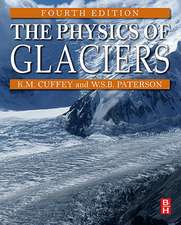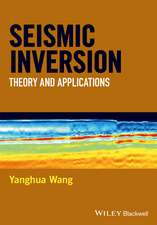Quantum Field Theory on Curved Spacetimes: Concepts and Mathematical Foundations: Lecture Notes in Physics, cartea 786
Editat de Christian Bär, Klaus Fredenhagenen Limba Engleză Hardback – 28 sep 2009
| Toate formatele și edițiile | Preț | Express |
|---|---|---|
| Paperback (1) | 464.97 lei 6-8 săpt. | |
| Springer Berlin, Heidelberg – 14 mar 2012 | 464.97 lei 6-8 săpt. | |
| Hardback (1) | 471.53 lei 6-8 săpt. | |
| Springer Berlin, Heidelberg – 28 sep 2009 | 471.53 lei 6-8 săpt. |
Din seria Lecture Notes in Physics
- 19%
 Preț: 424.00 lei
Preț: 424.00 lei - 17%
 Preț: 360.73 lei
Preț: 360.73 lei -
 Preț: 429.22 lei
Preț: 429.22 lei - 17%
 Preț: 427.62 lei
Preț: 427.62 lei - 17%
 Preț: 460.26 lei
Preț: 460.26 lei -
 Preț: 427.96 lei
Preț: 427.96 lei -
 Preț: 481.93 lei
Preț: 481.93 lei - 17%
 Preț: 494.66 lei
Preț: 494.66 lei -
 Preț: 281.90 lei
Preț: 281.90 lei - 17%
 Preț: 493.20 lei
Preț: 493.20 lei - 17%
 Preț: 426.72 lei
Preț: 426.72 lei -
 Preț: 365.15 lei
Preț: 365.15 lei -
 Preț: 374.52 lei
Preț: 374.52 lei -
 Preț: 407.98 lei
Preț: 407.98 lei - 20%
 Preț: 428.13 lei
Preț: 428.13 lei -
 Preț: 263.30 lei
Preț: 263.30 lei - 15%
 Preț: 593.73 lei
Preț: 593.73 lei - 15%
 Preț: 528.13 lei
Preț: 528.13 lei -
 Preț: 493.12 lei
Preț: 493.12 lei - 17%
 Preț: 425.68 lei
Preț: 425.68 lei -
 Preț: 280.65 lei
Preț: 280.65 lei -
 Preț: 163.41 lei
Preț: 163.41 lei - 18%
 Preț: 726.59 lei
Preț: 726.59 lei -
 Preț: 394.84 lei
Preț: 394.84 lei - 15%
 Preț: 709.63 lei
Preț: 709.63 lei - 15%
 Preț: 623.90 lei
Preț: 623.90 lei - 20%
 Preț: 476.93 lei
Preț: 476.93 lei - 15%
 Preț: 428.05 lei
Preț: 428.05 lei -
 Preț: 342.78 lei
Preț: 342.78 lei - 18%
 Preț: 851.93 lei
Preț: 851.93 lei -
 Preț: 346.61 lei
Preț: 346.61 lei -
 Preț: 391.57 lei
Preț: 391.57 lei - 15%
 Preț: 633.16 lei
Preț: 633.16 lei -
 Preț: 451.71 lei
Preț: 451.71 lei - 5%
 Preț: 1497.80 lei
Preț: 1497.80 lei -
 Preț: 374.85 lei
Preț: 374.85 lei -
 Preț: 380.07 lei
Preț: 380.07 lei - 15%
 Preț: 516.14 lei
Preț: 516.14 lei - 15%
 Preț: 583.78 lei
Preț: 583.78 lei - 15%
 Preț: 508.60 lei
Preț: 508.60 lei -
 Preț: 469.73 lei
Preț: 469.73 lei -
 Preț: 388.90 lei
Preț: 388.90 lei - 15%
 Preț: 500.24 lei
Preț: 500.24 lei -
 Preț: 386.52 lei
Preț: 386.52 lei - 15%
 Preț: 472.88 lei
Preț: 472.88 lei -
 Preț: 424.27 lei
Preț: 424.27 lei -
 Preț: 380.07 lei
Preț: 380.07 lei - 15%
 Preț: 500.01 lei
Preț: 500.01 lei
Preț: 471.53 lei
Preț vechi: 554.75 lei
-15% Nou
Puncte Express: 707
Preț estimativ în valută:
90.26€ • 98.07$ • 75.86£
90.26€ • 98.07$ • 75.86£
Carte tipărită la comandă
Livrare economică 21 aprilie-05 mai
Preluare comenzi: 021 569.72.76
Specificații
ISBN-13: 9783642027796
ISBN-10: 3642027792
Pagini: 172
Ilustrații: X, 160 p. 30 illus.
Dimensiuni: 155 x 235 x 14 mm
Greutate: 0.43 kg
Ediția:2009
Editura: Springer Berlin, Heidelberg
Colecția Springer
Seria Lecture Notes in Physics
Locul publicării:Berlin, Heidelberg, Germany
ISBN-10: 3642027792
Pagini: 172
Ilustrații: X, 160 p. 30 illus.
Dimensiuni: 155 x 235 x 14 mm
Greutate: 0.43 kg
Ediția:2009
Editura: Springer Berlin, Heidelberg
Colecția Springer
Seria Lecture Notes in Physics
Locul publicării:Berlin, Heidelberg, Germany
Public țintă
ResearchCuprins
C#x002A;-algebras.- Lorentzian Manifolds.- Linear Wave Equations.- Microlocal Analysis.- Quantum Field Theory on Curved Backgrounds.
Recenzii
From the reviews:
“This is a very nice book which captures in only 160 pages the most important aspects of the mathematical and conceptional foundations of quantum field theory on curved spacetimes. … the interested reader can find here an introduction to the key concepts and pointers towards further literature. I can recommend this book to readers who are new to the subject as an ideal starting point, and also to more experienced researchers who are looking for a short and concise overview.” (Michael Keyl, Mathematical Reviews, Issue 2011 f)
“This is a very nice book which captures in only 160 pages the most important aspects of the mathematical and conceptional foundations of quantum field theory on curved spacetimes. … the interested reader can find here an introduction to the key concepts and pointers towards further literature. I can recommend this book to readers who are new to the subject as an ideal starting point, and also to more experienced researchers who are looking for a short and concise overview.” (Michael Keyl, Mathematical Reviews, Issue 2011 f)
Textul de pe ultima copertă
After some decades of work a satisfactory theory of quantum gravity is still not available; moreover, there are indications that the original field theoretical approach may be better suited than originally expected. There, to first approximation, one is left with the problem of quantum field theory on Lorentzian manifolds. Surprisingly, this seemingly modest approach leads to far reaching conceptual and mathematical problems and to spectacular predictions, the most famous one being the Hawking radiation of black holes.
Ingredients of this approach are the formulation of quantum physics in terms of C*-algebras, the geometry of Lorentzian manifolds, in particular their causal structure, and linear hyperbolic differential equations where the well-posedness of the Cauchy problem plays a distinguished role, as well as more recently the insights from suitable concepts such as microlocal analysis.
This primer is an outgrowth of a compact course given by the editors and contributing authors to an audience of advanced graduate students and young researchers in the field, and assumes working knowledge of differential geometry and functional analysis on the part of the reader.
Ingredients of this approach are the formulation of quantum physics in terms of C*-algebras, the geometry of Lorentzian manifolds, in particular their causal structure, and linear hyperbolic differential equations where the well-posedness of the Cauchy problem plays a distinguished role, as well as more recently the insights from suitable concepts such as microlocal analysis.
This primer is an outgrowth of a compact course given by the editors and contributing authors to an audience of advanced graduate students and young researchers in the field, and assumes working knowledge of differential geometry and functional analysis on the part of the reader.
Caracteristici
Includes supplementary material: sn.pub/extras













